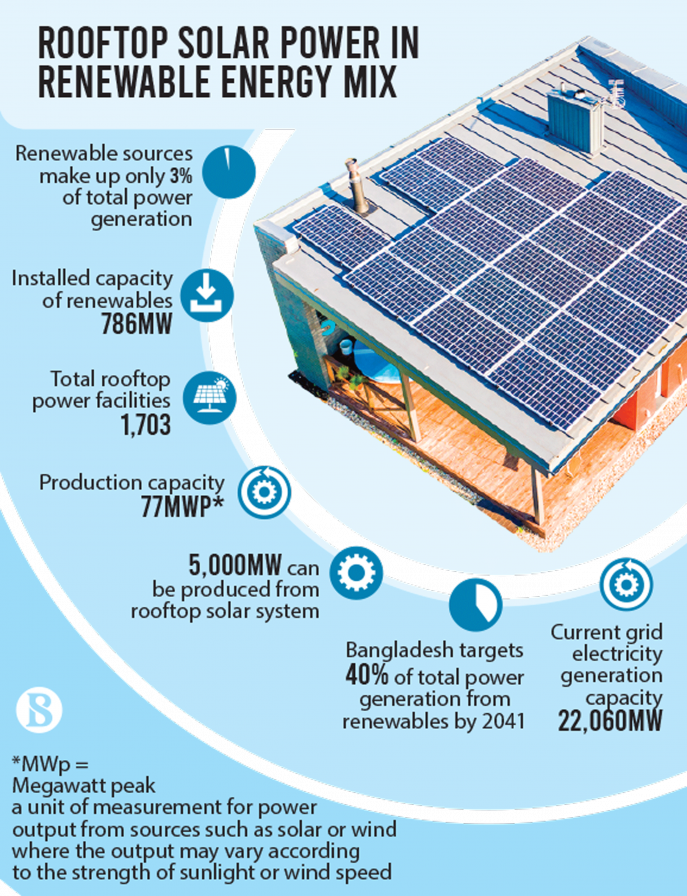Rooftop solar now a popular choice for industries to cut power bills
Rooftop solar system offers a ray of light in achieving target despite some shortcomings

Heritage Polymer and Lami Tube Ltd, a factory dealing in PVC pipes, fittings and packaging in Narayanganj's Sonargaon, had been paying a big amount of money to Narayanganj Palli Bidyut Samity-1 every month for electricity consumption until it got a solar park on its rooftop last month.
The factory's electricity bill has now dropped by around 34% with the 3.161 megawatt-peak (MWp) installed capacity of solar power.
In the daytime, the solar system produces electricity from sunlight and feeds the power distribution grid if generation is higher than consumption.
On 1 April this year, Akij Group, one of the leading business conglomerates in the country, also set up a 470kW rooftop solar plant at Janata Jute Mills located in Faridpur's Boalmari.
Rooftop solar thus comes as a popular choice for industries to minimise electricity cost.
As many as 1,703 firms and factories have installed rooftop solar systems under net metering model since 2018 to minimise energy costs and reduce carbon emission.
The government aspires to generate 40% of its total electricity from renewable sources by 2041 even though it now produces only 3% from renewables, such as solar, wind and hydro power.
The rooftop solar system offers a ray of light in achieving the target despite some shortcomings, among which are a lack of adequate land and a low speed wind, said Mahmood Malik, immediate past first executive director and chief executive officer at Infrastructure Development Company Limited (IDCOL).
The authorities are now trying to make use of the on-grid rooftop solar system to increase the contribution of renewable energy to the total energy mix.
Power distribution companies are encouraging industrial consumers to set up such projects on unused rooftops.
Bikash Dewan, managing director at Dhaka Power Distribution Company, said the company is implementing rooftop solar projects based on a yearly target.
Besides, some local renewable energy promoting agencies, such as IDCOL, Rahimafrooz Bangladesh Ltd and Alpine Technologies, have also come forward to expedite the rooftop solar programme under a cheaper but advanced model.
Alpine Technologies also provides a flat rate for a contract period of more than 20 years.
Being a solar energy solution providing company, Alpine Technologies provides both technical and financial feasibility studies, power output projections, electrical designs, combinations with existing substations, control panels, material procurement, quality control, system designs and detailed analyses, and operation and maintenance.
Md Tariqul Islam, CEO of Alpine Technologies, said his firm's model will reduce 30-40% of electricity bills of industrial consumers as the model uses unused or unutilised roof spaces of the industries.
"This is one of the finest ideas to reduce the power load of the industry along with rolling back carbon emission and raising the green standard of the industry," he said.
He also said returns from investment on installation of rooftop solar systems are very high, and it does not take more than 5 years to get a payback, said Md Tariqul Islam.
How an on-grid rooftop solar system works
If the rooftop owner connects the facility with the national grid through the net metering system, a billing mechanism that credits solar energy facility owners for adding electricity to the grid, the monthly electricity consumption will decrease and so will the bills.
During daylight hours, electricity generated from a net-metered rooftop PV system will go to the national grid if the generation exceeds the consumer's demand.
For feeding the national grid, electricity meters will run backwards to provide a credit to users and customers are only billed for their "net" energy use at the end of the month.
Solution offered by Alpine Technologies
To expedite rooftop solar power, Alpine Technologies offers its services in two methods – Capital Expenditure (CapEx) and Operational Expenditure (OpEx).
In the CapEx model, capital investment is done by end-users. It is the most convenient and simplified model where design and implementation are done by Alpine and its international EPC partner, with the end-users bearing the expenditure of the project.
On the other hand, under the OpEx model, end-users are liable to bear operational expenses only. To implement any project under this model, Alpine and its international EPC partner will design, implement and maintain the project whereas end-users will just pay a bill at a fixed rate that is lower than the Rural Electrification Board's rate.
This rate will be set and will be fixed by signing a power purchase agreement between both parties for 20 years.
What holds back expansion of rooftop solar power
Infrastructure Development Company Limited, a government-owned non-bank financial institution specialising in financing renewables, said around 5,000 megawatts of electricity can be generated by installing solar panels on the rooftops of readymade garments, textiles and other industries in the country.
However, at present, the country can generate only 77 MWp of electricity from 1,691 both on-grid and off-grid rooftops solar facilities.
Talking about this limited amount of rooftop solar electricity, Md Tariqul Islam said gas fired-captive power is a major problem in the expansion of on-grid rooftop solar power in industries.
Industry owners are reluctant to adopt a no-grid rooftop solar project as gas-fired captive power is the cheapest way of electricity production, he said.
"If the government wants to promote renewable energy, it should discourage gas-based captive-power," he added.
Apart from this, taxation and policy hindrances are significant reasons behind the slow pace in the expansion of rooftop solar.



 Keep updated, follow The Business Standard's Google news channel
Keep updated, follow The Business Standard's Google news channel
















